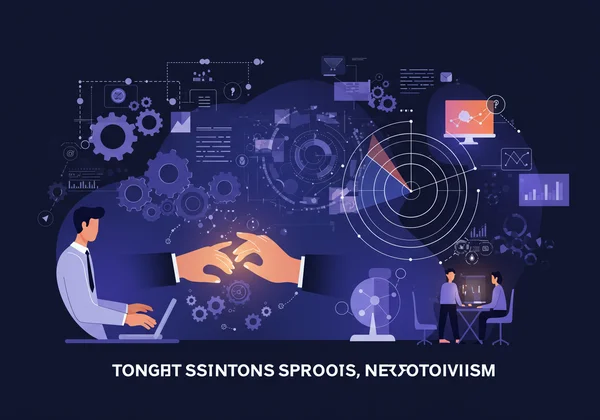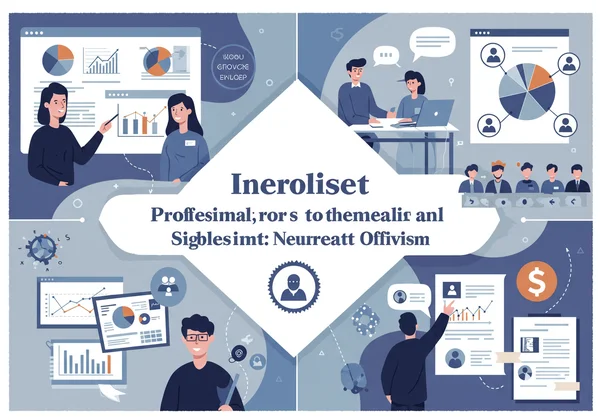Neuroticism at Work: Take a Neuroticism Test to Turn Sensitivity into Career Advantage
October 27, 2025 | By Alicia Campos
Feeling overwhelmed by workplace stress or constant criticism? High emotional sensitivity, a trait often linked to neuroticism, can sometimes feel like a disadvantage in your career. It might leave you overthinking interactions or taking feedback too personally. But what if you could harness this trait? What if that deep emotional landscape was actually a source of incredible professional strength? How do I know if I have neuroticism? This is a question many of us ask. The first step is understanding it, and a neuroticism test can be an enlightening tool on that journey. Discover how to transform your unique emotional depth into a powerful asset, allowing you to thrive professionally while gaining a deeper understanding of your psychological makeup. You can begin this journey of self-discovery by taking an emotional stability test.
High Neuroticism at Work: Common Challenges
Before we can leverage a trait, we must first understand its challenges. For those with higher neuroticism, the modern workplace can often feel like a minefield of potential stressors. Recognizing these common hurdles is not about labeling yourself; it's about developing self-awareness to navigate them more effectively.
Navigating Emotional Sensitivity in Professional Settings
A key aspect of high neuroticism is a heightened sensitivity to environmental cues, especially social ones. This can mean you're more likely to perceive ambiguity as negative or take constructive criticism to heart. A manager's offhand comment or a colleague's brief email can lead to hours of rumination. This sensitivity isn't a flaw; it simply means your emotional radar is turned up high, requiring conscious effort to differentiate between genuine issues and perceived slights.
The Impact of Stress and Criticism on Performance
Individuals with high neuroticism are often more susceptible to the effects of stress. When deadlines loom or pressure mounts, the tendency to worry can escalate, sometimes leading to analysis paralysis or difficulty concentrating. Similarly, criticism, even when delivered constructively, can feel intensely personal and may temporarily impact confidence and motivation. Learning to manage these reactions is crucial for maintaining consistent performance and well-being.
Avoiding Burnout and Triggers
Because you process emotions so deeply, you may be more prone to emotional exhaustion and burnout. Consistently worrying about performance, anticipating negative outcomes, and managing intense emotional reactions is draining. Recognizing your personal triggers—be it tight deadlines, public speaking, or interpersonal conflict—is the first step toward creating strategies to protect your energy and build resilience in your professional life. Understanding your baseline can help; a free neuroticism test provides valuable insight.

Neuroticism Career Strengths: Turning Sensitivity into Assets
Now for the empowering truth: the very same traits that present challenges can be your greatest professional superpowers when channeled correctly. High neuroticism is not a liability; it's a different operating system that comes with a unique suite of powerful applications.
The Power of Thoroughness and Conscientiousness
The tendency to worry about potential negative outcomes has a powerful upside: conscientiousness. People with higher neuroticism often produce incredibly meticulous and high-quality work because they've anticipated every possible pitfall. They are the ones who catch the tiny error in the report, double-check the data before a presentation, and think through every step of a project plan. This diligence builds a reputation for reliability and excellence.
Enhanced Risk Assessment and Problem Anticipation
Your mind's ability to run "what-if" scenarios makes you an exceptional risk assessor. While others may forge ahead with optimistic abandon, you have a natural talent for spotting potential weaknesses in a plan or anticipating future obstacles. In roles involving strategy, safety, compliance, or project management, this foresight is not anxiety—it's a highly valuable strategic advantage that saves time, money, and resources.
Empathy and Intuition for Stronger Connections
Heightened emotional sensitivity makes you incredibly attuned to the feelings of others. This translates into powerful empathy and intuition. You're more likely to notice when a teammate is struggling, understand a client's unspoken needs, or sense the underlying dynamics in a meeting. This ability allows you to build stronger, more authentic relationships, foster team cohesion, and excel in any role that requires deep interpersonal understanding. To see how this trait manifests for you, you can start your test today.

Managing Neuroticism at Work: Practical Tips for Thriving
Understanding your challenges and strengths is the foundation. The next step is building a toolkit of practical strategies to manage the former and amplify the latter. Thriving with high neuroticism at work is about creating an environment—both internal and external—that supports your unique wiring.
Cultivating Emotional Regulation and Self-Awareness
Self-awareness is your primary tool. Start by identifying the specific thoughts that trigger your stress response. Techniques like mindfulness meditation can help create a space between a trigger and your reaction, giving you the power to choose your response. Cognitive reframing is another powerful practice: consciously challenge anxious thoughts and ask, "Is this thought productive, or is it just a story I'm telling myself?" An initial neuroticism assessment can provide a clear map of where to begin.
Setting Healthy Boundaries Effectively
Because you feel things so deeply, protecting your energy is non-negotiable. This means learning to set firm, professional boundaries. Practice saying "no" to tasks when your plate is full, delegate when possible, and clearly define your work hours to protect your personal time. A simple phrase like, "I don't have the capacity for that right now, but I can look at it next week," is both professional and protective.
Building a Supportive Network and Seeking Feedback
Surround yourself with supportive colleagues and mentors who appreciate your strengths. When it comes to feedback, you can manage your sensitivity by proactively asking for it in a structured way. For example, say to your manager: "I'm working on this project and would love to get your feedback on points A and B. Could we schedule 15 minutes to discuss it?" This puts you in control and makes the process feel less like a judgment and more like a collaboration. To better understand your own feedback style, discover your traits.

Best Jobs for High Neuroticism: Pathways to Success
While anyone can succeed in any field, certain careers naturally align with the strengths of a high neuroticism personality. These are roles where your meticulousness, foresight, and empathy are not just appreciated but are requirements for success. Exploring these paths can feel less like fighting against your nature and more like leaning into your inherent talents.
Roles That Value Attention to Detail
Your conscientious nature shines in professions where precision is paramount. Consider careers such as:
- Data Analyst or Scientist: Where spotting patterns and ensuring data integrity is key.
- Editor or Proofreader: Where a sharp eye for errors is the entire job.
- Quality Assurance Specialist: Where anticipating what could go wrong is a core function.
- Accountant or Financial Analyst: Where meticulous accuracy is non-negotiable.
Careers Leveraging Interpersonal Insight
Your deep empathy and ability to read emotional currents are invaluable in human-centric fields. Potential career paths include:
- Therapist or Counselor: Where understanding and validating others' feelings is central.
- Human Resources Manager: Excelling in employee relations, conflict resolution, and creating supportive workplace cultures.
- User Experience (UX) Researcher: Where intuiting user frustrations and needs leads to better products.
- Coach or Mentor: Guiding others through their personal and professional growth.
Finding a Niche Where Preparedness is Paramount
Roles that reward careful planning and risk mitigation are a perfect fit for your forward-thinking mind. Look into:
- Project Manager: Juggling timelines, resources, and anticipating roadblocks.
- Compliance Officer or Lawyer: Navigating complex regulations and ensuring everything is in order.
- Academic Researcher or Scientist: Requiring patience, thoroughness, and a methodical approach.
Finding the right fit is about aligning your traits with the job's demands. A personality test neuroticism can be a fantastic tool to clarify your unique profile and guide your career exploration.

Embrace Your Emotional Depth: A Path to Professional Empowerment
Your emotional sensitivity is not a weakness to be overcome; it is a fundamental part of who you are, and it holds immense professional value. By understanding its challenges, embracing its strengths, and implementing practical management strategies, you can transform neuroticism from a source of stress into a catalyst for success. The journey starts with self-knowledge. Are you ready to understand your emotional landscape and use it to your advantage? Take the free Neuroticism Test on our homepage and start your journey toward professional empowerment today.
Frequently Asked Questions About Neuroticism and Careers
What does a high neuroticism score mean in a professional context?
A high neuroticism score suggests you may be more emotionally reactive to stress, criticism, and uncertainty at work. However, it also strongly correlates with positive traits like conscientiousness, thoroughness, and a greater ability to anticipate risks. It means your path to success involves actively managing your emotional responses while leveraging your innate diligence and foresight. Understanding your specific score is key; you can find out yours with our free neuroticism test.
Can you reduce neuroticism to improve job performance?
Neuroticism is considered a stable personality trait, meaning it's not something you can easily "reduce" or eliminate. However, you can absolutely change how you manage it. Through techniques like cognitive-behavioral therapy (CBT), mindfulness, and developing robust coping strategies, you can significantly reduce the negative impact of anxiety and worry on your job performance, effectively turning down the "volume" on your stress response.
How can mindfulness help manage neuroticism at work?
Mindfulness is a powerful tool for managing neuroticism because it trains you to observe your thoughts and feelings without judgment. Instead of getting swept away by a wave of anxiety, you learn to acknowledge it ("I am feeling anxious about this presentation") and let it pass without controlling your actions. This practice creates a crucial buffer between an emotional trigger and your reaction, promoting clearer thinking and calmer responses in high-pressure situations.
Are there specific industries where high neuroticism is more common?
While personality traits are distributed across all industries, some fields may naturally attract or reward individuals with higher neuroticism. Creative arts, for instance, often attract highly sensitive and introspective individuals. Similarly, academic and research fields value the meticulousness and deep thinking associated with the trait. Fields requiring high levels of risk management, such as finance or law, also benefit greatly from the foresight and preparedness that often accompany neuroticism.